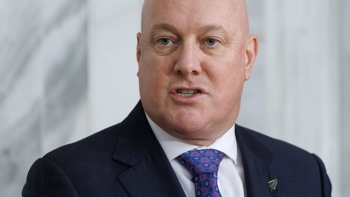The Head Hunters motorcycle club has gathered to pay respects to one of their fallen members, and police have turned out in force to keep the peace.
Charles Anthony Pongi, 32, died two weeks ago after turning up to Auckland City Hospital with gunshot wounds.
He had been injured after a planned one-on-one fight between an associate of the Head Hunters and a member of the 36 Crips street gang at a Pt England park, supported by their respective entourages, spiralled into a melee.
At least 20 shots were fired at Taurima Reserve on the afternoon of Saturday August 5. Pongi and a senior member of the Rebels motorcycle gang (who was supporting the Crips member) were later admitted to hospital.
The death of Pongi has led to a massive police investigation into the brazen gang violence, as well as fears of a tit-for-tat war between the Head Hunters and the Rebels.
The feud has not escalated, so far, but the police have mobilised a large number of staff to maintain the peace in Auckland today for Pongi’s funeral.
At least 25 officers stood shoulder-to-shoulder outside the Head Hunters’ pad in Ellerslie, as mourning gang members gathered before riding their motorcycles in convoy for a service at a church in Ōnehunga.
/cloudfront-ap-southeast-2.images.arcpublishing.com/nzme/IPMJOJYVPRDWVENFGJGPY4WKYI.jpg) Members of the Head Hunters gang gather outside a church in Ōnehunga for the funeral of Charles Pongi, who was fatally shot two weeks ago. Photo / NZME
Members of the Head Hunters gang gather outside a church in Ōnehunga for the funeral of Charles Pongi, who was fatally shot two weeks ago. Photo / NZME
Assistant Commissioner Sam Hoyle, the officer responsible for all three police districts in Auckland, said police will be “highly visible” over the coming days because of the funeral.
“Police expectations on acceptable behaviour are very clear and we will be targeting any anti-social or violent behaviour taking place,” Hoyle said.
“While we understand people need to grieve, this should be done without putting the wider community’s safety at risk.
“It is the family’s wish that everyone pays their respects peacefully.”
Hoyle said that anyone who chooses to put the community at risk will be held to account.
/cloudfront-ap-southeast-2.images.arcpublishing.com/nzme/MMJZHYVKCJDFLHKZGTOZT3X6F4.jpg) Police gathered in force outside the Head Hunters pad in Ellerslie before the funeral of Charles Pongi. Photo / Supplied
Police gathered in force outside the Head Hunters pad in Ellerslie before the funeral of Charles Pongi. Photo / Supplied
Over the coming weeks, Hoyle said police will continue to “conduct visible disruption and enforcement activity” in response to Pongi’s death.
He said police will also be “working with other parties on long-term solutions” to ease any tensions between gangs.
So far, just one person has been arrested: a Head Hunter for allegedly breaching the conditions of their electronically monitored bail while on active charges of manslaughter and drug dealing.
“This is by no means the end of the matter,” Detective Inspector Glenn Baldwin has said previously.
On Friday last week, armed police raided the Rebels MC pad in Ōtāhuhu, which Baldwin described as a “location of interest” in the investigation into Pongia’s death.
“I can reassure the public that our investigation is developing well, and our team is starting to focus on key individuals,” Baldwin said.
“This was an incredibly alarming incident for the community in Pt England … We have no tolerance for violence or unlawful activities.”
The Weekend Herald has previously reported that tension existed between the Head Hunters and the Rebels even before the shooting at Taurima Reserve.
The relationship soured when a member of the Rebels was seen wearing a patched leather vest with a “west” label on the front. This label is referred to as the “side rocker” and denotes the territory of a particular chapter of the gang: the Head Hunters have considered West Auckland to be their turf for more than 30 years.
This grievance led to talks between the Rebels and the west chapter of the Head Hunters.
The Weekend Herald understands Rebels Māngere president Ray Elise was at the meeting, as was his close friend, the 36 Crips leader involved in the Taurima Reserve fight.
However, the negotiations went nowhere and the Head Hunters soon issued an AOS (Attack on Sight) order to their members to assault any Rebels they crossed paths with.
The dispute boiled over last month at Sylvia Park, one of Auckland’s largest shopping malls.
A fight broke out between members of the Head Hunters and the Rebels in the mall’s food court during lunchtime, with witnesses describing one man brandishing a knife. Armed police swarmed Sylvia Park and two men with links to the Rebels were arrested.
/cloudfront-ap-southeast-2.images.arcpublishing.com/nzme/D6GLDTDYL5FU7HHKO4ESQA567A.jpg) Charles Pongi, 32, was a patched member of the East chapter of the Head Hunters motorcycle club in Auckland. Photo / Supplied
Charles Pongi, 32, was a patched member of the East chapter of the Head Hunters motorcycle club in Auckland. Photo / Supplied
The death of Pongi was a separate issue but with emotions running high, the problems could escalate the tension between the Rebels and the Head Hunters.
Both gangs have been involved in armed skirmishes in recent years, albeit with different rivals.
For the best part of the past two decades, the Head Hunters had real power in Auckland’s criminal underworld. It was once a ragtag bunch of teenage misfits with humble beginnings in Glen Innes in 1967, but over time built a reputation for never taking a backwards step.
Their propensity for violence allowed the Head Hunters to muscle their way into the methamphetamine trade, which exploded in the early 2000s, with members of the gang enjoying the fruit of their ill-gotten gains: money, power and influence.
The East chapter, based at 232 Marua Rd in Mt Wellington, began to grow. Once a tight-knit group of about 30, more than 300 East members now wear the flaming skull patch.
They spread across the country by muscling into rival gang territory in Northland and the Bay of Plenty, to the Wairarapa and Wellington, and even as far south as Christchurch.
But in recent years their dominance has been challenged by the arrival of Australian gangs, such as the Comancheros and Mongols, after senior members were deported as “501s” to New Zealand.
The Head Hunters have been involved in armed feuds with both of those gangs, in particular the Mongols, with the spiritual home of Marua Rd being sprayed with semi-automatic gunfire on several occasions.
Such an attack would have been unheard of 10 years ago. The most infamous episode of retaliation ended with a Head Hunter shooting at a Mongol associate (a former Head Hunter) inside a swanky Auckland hotel.
But until recently, the Heads have been on friendly terms with the Rebels.
The Rebels are considered one of Australia’s largest bikie gangs and criminal enterprises.
They set up shop in New Zealand more than a decade ago and their ranks have recently been bolstered by prominent 501 deportees.
Among their number are Mace Rayond Sitope, better known as Ray Elise, who was raised in South Auckland and later became president of the Rebels chapter in Victoria.
He set up the Rebels Māngere chapter after he was deported in 2020.
The following year, that chapter became embroiled in a violent tit-for-tat clash with the King Cobras (KCs) characterised by shootings and firebombings.
The KCs were aggrieved at the Rebels encroaching on their traditional turf and their use of the “Māngere” rocker label on their patches.
Take your Radio, Podcasts and Music with you









